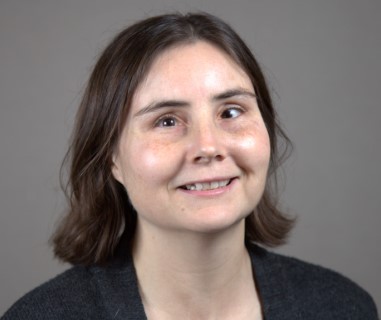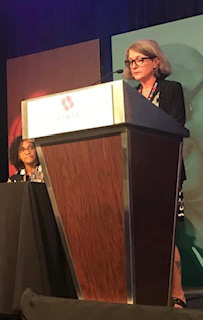Programmes et services
juin 2, 2023 Workshop: 2023 Symposium de Braille Literacy Canada : Le braille sans frontières

Date : vendredi, juin 2, 2023
Heure : 1:00 PM (EST)
Resources
- Audio recording available
- Additional resource documents are available
Braille Literacy Canada (BLC) held its third annual virtual braille symposium on Friday, June 2, 2023 from 1 – 5 PM EDT (10am-2pm Pacific/11am-3pm Mountain/Saskatchewan, 12pm-4pm Central, 2pm-6pm Atlantic, 5pm-9pm UTC).
To watch all of the presentations, check out the Braille Symposium 2023 Playlist on our YouTube channel!
Schedule overview
- 1:00pm EST: Concurrent English/French presentations:
- English: About Braille Files (James Bowden, RNIB, Braille Technical Officer)
- French: Les albums tactiles illustrés des Doigts Qui Rêvent, presque 30 ans d'innovation (Sophie Blain, Les Doigts Qui Rêvent)
- 2:00pm EST: I-M-ABLE: Individualized Meaning-Centered Approach to Braille Literacy Education (Dr. Diane Wormsley, Brenda Brodie Endowed Professor, North Carolina Central University, Retired)
- 3:00 pm EST: Expanding the Frontiers of Literacy: Developing Braille Codes for Indigenous Languages (Jen Goulden and Christine Muise)
- 4:00pm EST: Unified English Braille Across Borders (Frances Gentle, Josie Howse, Craig Cashmore)
Each presentation will be approximately 30 minutes long, followed by a 15 minute question-and-answer period, and then a 15 minute intermission. More information on our exciting line up of speakers is provided below.
Thank you to our incredible sponsors!
We would like to take a moment to thank all of our sponsors who, through their generous support, are helping to make this event a true success, including by donating some incredible door prizes and special offers that you will not want to miss!
- Canadian Assistive Technology, and its team have been involved in the Assistive Technology sector for over 33 years. They bring expertise, empathy and service to their customers while delivering all the accessibility tools they need in order to be successful in the workplace or when engaging in favourite activities in the home.
- Kids Can Press, part of the Corus Entertainment family, is the largest Canadian-owned children’s publisher and the 2017 recipient of the distinguished Bologna Prize for the Best Children’s Publisher, North America. The publisher’s catalog includes an award-winning list of over 700 picture books, nonfiction and fiction titles for children and young adults that are translated and sold around the world. Kids Can Press is celebrating its 50th Anniversary during 2023.
- Humanware is the global leader in technology-based solutions for the visually impaired. We offer a wide range of innovative products including the BrailleNote Touch+ Brailliant braille display, the entire line of Victor Reader digital audiobook players, including Stream 3, Connect 12 electronic magnifiers, Reveal 16 screens, and Explore ultra-compact electronic magnifiers.
- Crawford Technologies, is an award-winning, global provider of software solutions and services that help enterprises optimize and improve the secure and accessible delivery, storage and presentment of their customer communications.
- Scotiabank, is on a mission to make hockey more diverse, more inclusive and more accessible to all. Most children’s hockey books don’t feature players of colour. They have created The Hockey Jersey – a new hockey story to inspire the next generation.
- Select Roses, is a full-service flower shop in Saskatoon that is fun, friendly, and inviting from the moment you walk in the door. We strive to make our customers feel comfortable and have the expertise in flowers and modern design so you don't have to - This is what makes Select Roses Saskatoon's best flower shop.
- Groundwood Books, was founded in 1978 by Patricia Aldana with a mandate to publish children’s books of the highest possible quality for all ages, which has grown to include fiction, picture books, graphic novels and nonfiction. Our award-winning, critically acclaimed list is known for being ahead of the curve, justice oriented, and unafraid of tackling stories that may be considered difficult or controversial — but always centered on a child’s point of view. We believe that books can be important without sacrificing warmth, beauty, playfulness and humor. Braille editions for selected books are available from Groundwood Books.
- CNIB Beyond Print are global industry experts in accessible formats, producing braille, electronic publications and audiobook materials for individuals and organizations across Canada. CNIB Beyond Print works with commercial enterprises, independent publishers, federally regulated and government organizations and educational bodies to address print equity & inclusion on a national scale. Our partners are accessibility innovators who have an on-going commitment to improving access for all Canadians with print disabilities.
- Purdys Chocolatier, a proud, family-owned Canadian chocolatier that prides itself in its exclusive use of sustainable cocoa, and which has gained world-wide attention for its introduction of their fully accessible, braille-labelled 18 pc Braille Box chocolates!
- National Braille Press is the premier braille publisher in the US specializing in producing original braille works written by blind authors expressly for blind people. NBP promotes literacy for blind children through outreach programs, encourages the teaching of braille to blind children by providing age-appropriate braille reading and support materials for caregivers and educators, and promotes braille literacy as an important employment and general living skill. NBP also provides braille transcription and braille production services to like-minded organizations and to businesses to support braille and accessibility for all.
We are very grateful for the support from our wonderful sponsors.
About Braille Files
Presented at 1pm EST (10am Pacific, 11am Mountain/Saskatchewan, 12pm Central, 2pm Atlantic, 5pm UTC) by James Bowden
In this workshop James will attempt to demystify the various types of braille and braille files. What is six- and eight-dot braille, computer and literary braille? What do braille files contain? How do you create them, read and navigate them, and what are their advantages?
What about the future? James will talk about the ongoing work of the eBraille project which aims to overcome current limitations of braille files.

James Bowden works at the RNIB as the Braille Technical Officer, handling queries about braille and is involved in various braille-related projects both in the UK and internationally. In recent years these have included the launch in the UK of the Orbit Reader braille display and associated SD card containing braille books, testing braille music translation software and improving the Liblouis translation system. James is involved of various braille standards bodies including the UK Association for Accessible Formats Braille groups and is the current UK rep to the International Council on English Braille. A lifelong braille reader, James is passionate about all things braille, including an interest in grade 3. He is familiar with several braille codes including the technical aspects of UEB, braille music and some foreign languages.
Les albums tactiles illustrés des Doigts Qui Rêvent, presque 30 ans d'innovation (en français)
Presented at 1pm EST (10am Pacific, 11am Mountain/Saskatchewan, 12pm Central, 2pm Atlantic, 6pm UTC) by Sophie Blain
Sophie Blain, Executive Director of Les doigts qui rêvent, will emphasize the importance of tactile illustrations for building literacy and phonological awareness in children aged 2 and older who are blind or have low vision. She will then present the types of tactile illustrations produced at Les Doigts qui rêvent, the methods used to produce them and some tools to introduce them to children. Finally, she will present two innovative projects: an eBook in which visually impaired children can set the legibility of the illustrations and a tactile book with connected fabric which trigger sounds depending on the child’s haptic manipulations.
Please note this workshop will be offered in French.

Sophie Blain, éditrice jeunesse spécialisée en édition accessible aux enfants déficients visuels, elle dirige les éditions benjamins media de 2001 à 2016 (album, livre audio, livre en braille, livre numérique au format epub3, illustration en relief), puis dirige les éditions Les Doigts qui Rêvent depuis 2018 (albums tactiles illustrés). Pour Les Doigts Qui Rêvent, en plus de la direction du projet associatif, elle pilote des projets de création de supports de lecture innovants, projets qui mixent lecture numérique et tissus connectés. Au fil des publications, son expertise en termes d’accessibilité au livre et à l’écrit des personnes en situation de handicap s’est accrue, tant en direction des publics avec handicap sensoriel (visuel, auditif) que cognitif, mental, mais aussi moteur. En plus de son métier d’éditrice, elle forme aussi à l’accessibilité des professionnels du livre et de la culture (formation continue) ou futurs professionnels (formation initiale).
I-M-ABLE: Individualized Meaning-Centered Approach to Braille Literacy Education
Presented at 2pm EST (11am Pacific, 12pm Mountain/Saskatchewan, 1pm Central, 3pm Atlantic, 7pm UTC) by Dr. Diane Wormsley
I-M-ABLE begins with words which are meaningful to a student, to help engage them, motivate them, and provide for success in learning to read. This presentation will include information about when this approach might be useful to use with what types of students. Differences between this approach and traditional approaches are discussed. Case studies of students with whom the approach has been used will give presenters an idea of the approach in action. Resources for learning more about the approach and additional reading material for those interested in implementing the approach will be provided.

Diane Pomeroy Wormsley, Ph. D. (University of Pittsburgh 1979) began her teaching career at the New York State School for the Blind. She taught in Australia and Papua New Guinea, was Assistant Professor at Illinois State University; Assistant to the Dean, College of Health Sciences University of Wyoming; Educational Specialist and Regional Director for American Foundation for the Blind. She was also Program Director and Associate Professor at Pennsylvania College of Optometry (now Salus University) and the Brenda Brodie Endowed Chair and Professor in Special Education at North Carolina Central University, retiring in 2015. In retirement, she served briefly as Executive in Residence at American Printing House for the Blind. She is former Editor-in-Chief of the Journal of Visual Impairments and Blindness and served as an Associate Editor of the Journal through 2021.
Her publications include: Braille Literacy: A Functional Approach, Braille Literacy Curriculum, and I-M-ABLE: The Individualized Meaning-Centered Approach for Braille Literacy Education. She co-authored Foundations of Braille Literacy, and co-edited Instructional Strategies for Braille Literacy. She has published numerous articles on her research including the ABC Braille Study and braille literacy, and has presented on those topics at conferences and workshops around the world. She continues to be engaged in consulting and presenting workshop and webinars on I-M-ABLE.
Among her awards are the Distinguished Alumni Award from the School of Education at the University of Pittsburgh, the Alan J. Koenig Research in Literacy Award and the Holbrook-Humphries Award from Getting in Touch with Literacy, and the Mary K. Bauman Award and the C. Warren Bledsoe Award (for Instructional Strategies for Braille Literacy) from the Association for Education and Rehabilitation of the Blind and Visually Impaired.
Expanding the Frontiers of Literacy: Developing Braille Codes for Indigenous Languages
Presented at 3pm EST (12pm Pacific, 1pm Mountain/Saskatchewan, 2pm Central, 4pm Atlantic, 8pm UTC) by Jen Goulden and Christine Muise
Many languages around the world do not yet have a written orthography, and there are even more that still need a braille code. In this session we will highlight best practices for developing braille codes as well as the issues to consider throughout the process. We'll provide an overview of the development of the Mi'kmaw braille code and discuss factors which can help ensure that a code truly meets the needs of the braille readers who will rely on it for literacy and independence.

Jen Goulden is an Accessibility Compliance Support Manager with Crawford Technologies and holds a Master's degree in linguistics from the University of Ottawa. She is a certified braille transcriber, including UEB Technical. She was the President of Braille Literacy Canada from 2011-2018 and is the Treasurer of the International Council on English Braille. She is CNIB’s representative to the Braille Authority of North America (BANA) and currently serves as the BANA Chair. She is a piano player who loves Jane Austen, dark chocolate and the Lord of the Rings.

Christine Muise (Halifax, NS) has been a certified Braille Transcriber with APSEA for over 15 years, as well as being a contract transcriber and volunteer. The majority of her work has been UEB Technical with tactiles. Last year she was honoured with the Louis Award from APH for her work in the creation of the Mi'kmaw Braille Code. In her off time, she enjoys renovating her house, and kayaking when the Atlantic Canada weather cooperates.
Unified English Braille Across Borders
Presented at 4pm EST (1pm Pacific, 2pm Mountain/Saskatchewan, 3pm Central, 5pm Atlantic, 9pm UTC) by Frances Gentle, Josie Howse and Craig Cashmore
This presentation will introduce the online literary and mathematics training courses in Unified English Braille which were developed by NextSense (Australia). The courses were created in response to requests from the blindness field in Australia and New Zealand, and to offer our support in addressing the chronic shortage of braille teachers worldwide, as identified by the World Blind Union.
Up until the launch of our first UEB online program in mid-2014, NextSense had provided in-person training in braille for specialist educators for 20 years. These in-person courses attracted around 40 braille learners each year and it was anticipated that the online braille courses would increase enrolments to 100 braille learners annually. To our surprise, the online braille courses have reached around 31,000 braille learners from more than 150 countries since 2014. We believe this strong uptake across national borders is associated with offering the courses in visual and non-visual access mode, the basic technology requirements, sequential nature of the lessons, and the lack of a fee to register and complete the courses. The registration process enables subscribers to create a personal profile and work through the braille lessons at their own pace from any computer, saving their work as they go.
In this presentation, we aim to achieve the following objectives:
- Overview of the braille training courses and resources offered on the UEB Online website
- Target audience, access options, and technology required
- Real time (live) demonstration of the user experience
- How to seek help
- Future plans

Frances Gentle (AO) is President of the International Council for Education of People with Visual Impairment (ICEVI). She is a member of the academic and research staff at the NextSense Institute and a lecturer in the Master of Disability Studies program at Macquarie University (Australia). Her research interests include rights-based legislation and policies and disability-inclusive education for children with blindness, low vision, deafblindness and multiple disability.

Josie Howse (PSM) is an Adjunct Research Fellow with the NextSense Institute and former Manager of the Braille and Large Print Services, NSW Department of Education. Josie has extensive experience in braille code development both in Australia and at an international level. Josie was editor of the inaugural UEB Braille Primer: Australian Edition, published in 2006, and is co-editor of the first and second editions of the UEB Australian Training Manual (2016; 2022). She recently authored the UEB Online training modules for Introductory, Advanced and Extension Mathematics and has supported the many UEB Online subscribers as they complete their exercises.

Craig Cashmore is the Founder and Director of PeppaCode Pty Ltd, a web and app development business focused on 'out-of-the-ordinary' strategic web and software development for small business, start-ups and educational institutions. Craig's achievements include the successful launch of UEB Online and implementing educational apps for visually impaired children. Craig continues to work on new and innovative projects using modern web technologies.